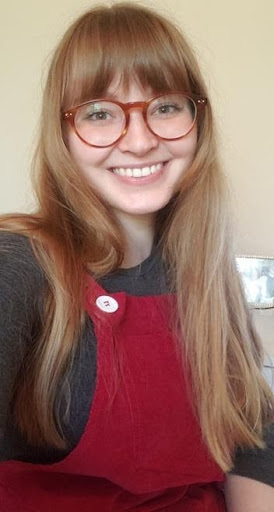Posted on January 27, 2022
 By Alex Alverson, Class of ’23 MA Candidate, UNCG, Department of Communication Studies
By Alex Alverson, Class of ’23 MA Candidate, UNCG, Department of Communication Studies
Jessica Clifford, a graduate student in Communication Studies at UNCG, worked throughout the 2020-2021 academic year with the Greensboro History Museum to host Greensboro’s first Democracy Tables. The project, designed to showcase ordinary people’s voices on critical issues, was funded by a National Communication Association grant awarded to UNCG to establish the Center for Communication, Community and Collaboration, and Change. The Center partners with community-based organizations that create sustainable change for underrepresented and vulnerable communities through the production and application of communication scholarship and practice.
Democracy Tables launched in Greensboro in September 2021 via Zoom as the world responded to the pandemic with virtual instead of in-person events. Democracy Tables brought people together first in the fall and then the spring to discuss voting rights, policing, and housing equity. Each topic was organized to offer three different conversation spaces over a period of two weeks. Community members and students were able to “sit” together in online breakout rooms to discuss their views as volunteer facilitators ensured everyone had ample opportunity to speak and listen to one another. A final Facebook Live event for each topic featured area experts responding to the many issues and questions raised during the earlier conversations. Additional resources are archived with the Greensboro History Museum at https://greensborohistory.org/democracytables.
Jessica worked closely with UNCG faculty, museum staff, and other area college students to publicize Democracy Tables hosted in: September-October 2020 (voting); February-March 2021 (policing); and March-April 2021 (housing). She collected survey data, managed technical duties for the program’s online delivery, prepared conversation guides, and facilitated some events. Her communication knowledge and skills were paired with an important community effort.
During one of the Democracy Tables devoted to the discussion of housing and equity, Jessica was touched by one student’s story of once facing issues with housing. “I felt as though I made a really strong connection with someone because I too experienced housing issues as an undergraduate student,” said Jessica. Following that experience, Jessica reached out to learn more about the young woman’s background and stayed in close contact with her for a short period after the Democracy Tables.
After the inaugural year of Democracy Tables, Jessica developed new topics for future discussions that are sure to have wide appeal—free speech, threats against democracy, and gerrymandering. Jessica looks forward to seeing Democracy Tables offered in the face-to-face format and expanded to other cities because, she says, “democracy tables are an important way of creating conversation about social change within a community.”